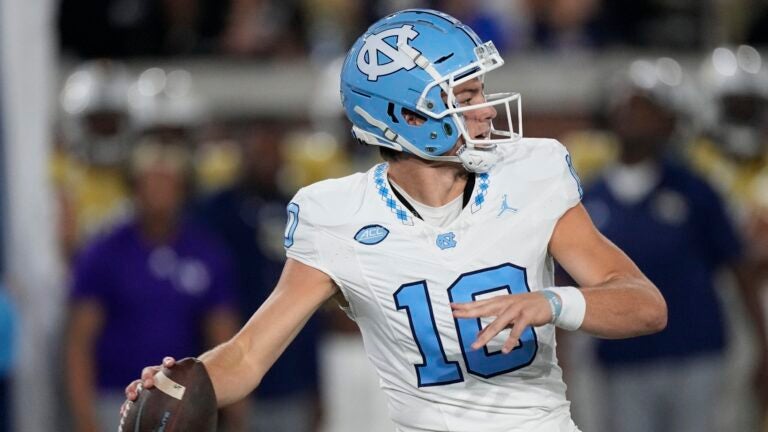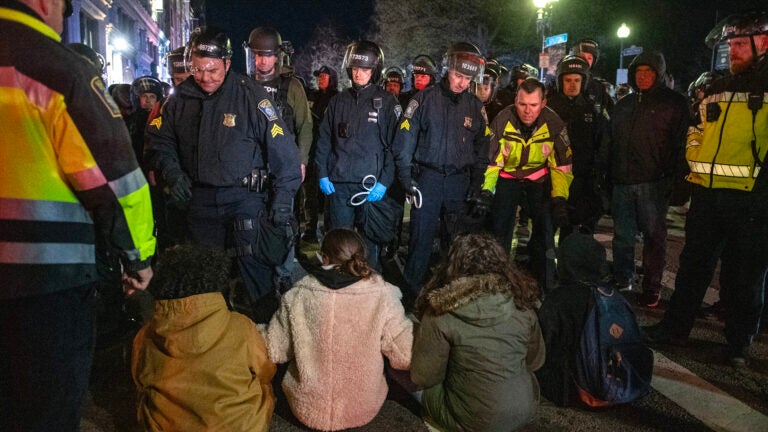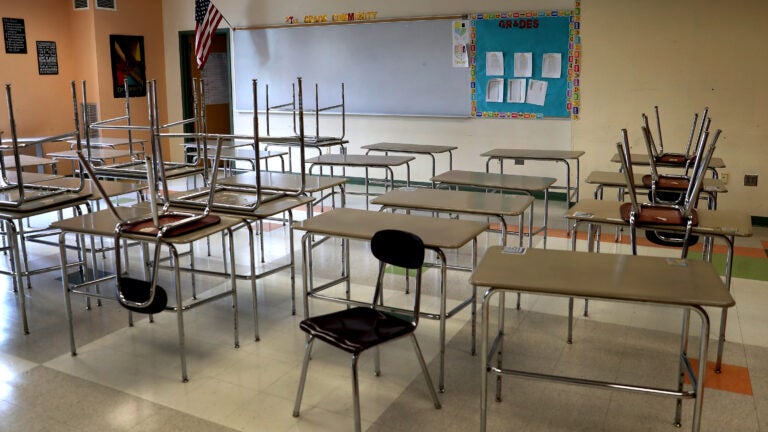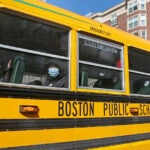What Boston students want you to know about school during the COVID-19 pandemic
“Students aren’t just a statistic on a piece of paper.”
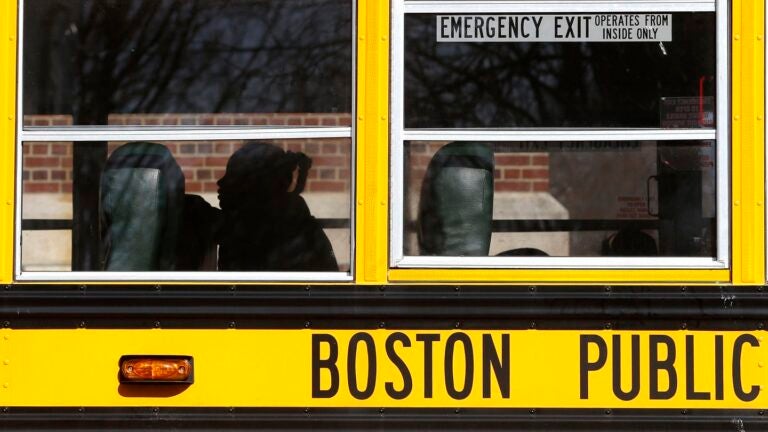
Boston students are nearing the end of a second school year under the coronavirus pandemic.
Related Links
As the students have spent month-upon-month engaged in online learning, officials at all levels of government have expressed concerns about the wellbeing of the young learners and debated the path for getting kids back into classrooms. Through all the back-and-forth over the best steps for returning to hybrid or in-person learning, students have continued to do their best despite the disruption, isolation, and challenges they face on a daily basis from the pandemic.
To learn more about what students are experiencing, we asked five students in the Boston Public School district to share their concerns, their feedback for officials, and what they hope others can learn from what they have gone through since the pandemic began.
The interviews have been edited for clarity and length.
Augustine Nguyen
Neighborhood: Dorchester
Grade: Junior at Boston Latin School
Age: 16
Engaged in remote learning
What has your experience as a student been like since the pandemic began? How has it impacted you as a student?School gave me a structure, a schedule that I could follow. But when the pandemic hit, that structure got taken away. I went through it; I did all the work. But I had to really learn about self-discipline in regards to how to make my own schedule and try to format my life on my own, which I didn’t really have much experience doing at first.It was really easy for the first few months of the pandemic. It felt like everything was super boring. I was in my room for like 20 hours a day, couldn’t go outside. It was hard. Over the summer, I started working remotely and that gave me some more structure. So I just had to learn how to self-discipline myself … There’s a lot more structure now. But at first, it was pretty bad.How do you feel about returning to in-person learning or a hybrid model?I want to stay remote for the rest of the school year for a few reasons. The hybrid model obviously started [in March], but there are a few problems with it. At our school, I think if all the kids were to return to in-person learning by the end of the year, I don’t think that our school has enough room for everyone to be socially-distanced and safe. It was crowded already before the pandemic.And also, the hybrid model does have its flaws. For example, what they’re doing now is that each kid who attends school for the hybrid model, they’re just joining their Zoom classes in school. So it’s like online school, but you have to be in school and you don’t have the comfort of the home. There are internet troubles. There’s poor ventilation so the windows have to be open and it’s cold.So for someone like me, who has stable internet access at home and has a good home living condition, I don’t really benefit from the advantages of the hybrid model. I understand the need for hybrid, in-person models for a lot of students … I’m still nervous about going to school, even if it’s hybrid or if it’s all in-person.What has been the most challenging aspect of being a student during the pandemic that you feel like adults or elected officials don’t understand?The lack of social interaction for kids our age … I think a lot of the problems students are facing are definitely mental. It’s hard to not be able to go out and not be able to see your friends. And it’s really hard for teachers and administrators to see that through a camera on Zoom.Is there anything you feel you’ve learned over the last year — about yourself, the world, your community — because of COVID-19?I’ve learned a lot about myself. There were a lot of periods of self-reflection. I’m at the point where I need to decide where I want to go in life, so the pandemic has really given me time to think about a lot of things, about myself. My friends have actually gotten closer to me during the pandemic because we’re all facing the same issues, and we’ve actually been talking to each other every day … I’m trying to become an adult, I’m trying to learn what “adulting” is. And this pandemic, it’s sped that up a little bit. I’ve been paying attention to the news a lot more because of it.

Augustine Nguyen.
Do you think adults and elected officials are listening enough to young people and students when it comes to schools and education during the pandemic — or more generally?
I think our head of school has done a really, really good job of keeping communication with students daily about what’s going on with the district. This might not be the same for other schools … I’m not feeling completely helpless or alone as a student. I think what the district’s doing right now — they’re communicating pretty well and obviously they’re trying the best they can. Obviously there’s bureaucracy that’s super, super slow. But it doesn’t feel completely hopeless.
What do you think people can learn from what you’ve experienced this year?
Just thinking about how my friends and family helped me through this pandemic, I think people can learn that you shouldn’t do things alone. Keep in contact with your friends, family. Do more together. I’ve seen news stories of communities coming together to help each other. I came together with my friends to help each other, I came together with my family to help each other.
What would you want to say to officials who are making pandemic-related decisions for schools and education?
Everyone, each student and their family is extremely diverse and they each have different needs. I understand it’s difficult to cater to those needs, but students aren’t just a statistic on a piece of paper. There are a bunch of nuances that can be hard to account for, that should be accounted for.
Khymani James
Neighborhood: Dorchester
Senior at Boston Latin Academy
Age: 17
Engaged in remote learning
How do you feel about returning to in-person learning or a hybrid model?I am never going back … It’s simply not safe. This is really personal — it’s how my parents, how my guardians feel. The district doesn’t have the resources and isn’t willing to gather the resources to truly make in-person learning safe. And what’s even more frightening and annoying is that they’re not willing to bring forward student and parent voice — authentic student and parent voice — to help them build what that model will look like and if it will actually be safe.I’m not going back to school if someone who hasn’t been a teacher in the building for several years, or is not a teacher at all, is making the decisions about how it’s supposed to look. I need teachers who are actually in the school building and students who are actually in the school building — specifically students with high needs — to be the ones at the table, making decisions. Because they are the ones who are actually going to be living it … I need people who are willing to let the science dictate the agenda — not let the agenda dictate the science.How has the pandemic impacted you or your family?

Khymani James.
Some of my family members in my extended family contracted COVID earlier in the pandemic, and that was very scary. Especially because when you couple that with having to go to school and the amount of work we were having and the virtual space. It’s kind of like we had no time to just think about family and be with family … I feel like elected officials, they know students are stressed, but they don’t know to what magnitude students are really stressed. And that’s the problem … They don’t really dig deep into the logistics behind what it is, what it consists of having to be up to two in the morning doing homework to then wake up at seven, eight in the morning to do it all again. And then to try and find time with your family somewhere in that.
You haven’t seen your grandparents in forever because you’re afraid if you go to them, they’ll contract COVID. You’re cooped up in your room, your family’s wondering why you aren’t spending any time with them or talking to them, you’re forgetting to eat, you’re forgetting to shower, you’re forgetting to just breathe and remember that there are people starving in the world. That’s what people need to understand. We’ve become so self-centered and wrapped up in this work-life. We’re just working. This is no way to live. It’s really depressing and it’s really sad … It’s been incredibly exhausting.
Is there anything you feel you’ve learned over the last year — about yourself, the world, your community — because of COVID-19?
I’ve learned that grades mean absolutely nothing. And it has reassured me that the grading system is both punitive and racist. That’s literally it.
What are you most concerned about for students living through this pandemic?
I’m most concerned that they’re going to lose passion for school and for education. I was raised in a household where education is key. So to see students, including myself, not want to wake up for school — it shouldn’t be like that. I’m really afraid that students are going to lose all will to truly participate in education. I’m afraid that they’re going to become so desensitized to the inequities that they don’t even care, they don’t want to do anything.
Do you think adults and elected officials are listening enough to young leaders and students when it comes to schools and education during the pandemic — or more generally?
No. They never were, and they’re still not. There are a few, but … there isn’t enough for me to say “yes” to that question. So the answer is “no,” which is really sad because without us, they wouldn’t have a city to run, a district to run. They’d all be unemployed.
What do you think people can learn from what you’ve experienced this year?
We’ve been running the education system wrong. Education in this country is run like a business because we live in a capitalist society, and it doesn’t have to be that way. Education doesn’t have to be memorization and regurgitation of material for a standardized test that allows a school or a district to get more funding. It should be an education system where there is an emphasis on the quality of work and the attainment of knowledge that a student can later apply to society in order to be, not only a functioning piece of society, but a trailblazer for change of society.
That ties into so much. We need to decolonize our curriculum, we need to take away that Eurocentric lens that we teach it in, and we need to completely revamp it with culturally relevant, culturally inclusive, current text and resources that will actually get our youth the content, knowledge, and material they need to really engage in these complex issues and conversations that our society is currently battling.
What would you want to say to officials who are making pandemic-related decisions for schools and education?
Let the students take over. If you’re thinking about putting together a body of say 15 people for a working group to make pandemic-related decisions for schools or decisions for schools in general, have 10 out of those 15 be students.
Charlene Adames-Pimentel
Neighborhood: South Boston
Grade: Senior at Boston Latin Academy
Age: 17
Engaged in remote learning
What has your experience as a student been like since the pandemic began? How has it impacted you as a student?In the beginning of the pandemic, it felt like a breeze. Because when the pandemic started in March, I was just going through my workload with the same teachers, so it wasn’t as hard. I was just completing the school year, the school year was basically over. Going into senior year though, it became very difficult because there were new expectations of me. I had college work; I applied to 20 different schools. The workload just became increasingly a lot.Recently, I lost my cousin in a very tragic accident … It was extremely hard. It still is hard for people during the pandemic, because I feel like schools are not showing empathy towards their students.I wasn’t feeling supported enough. Fortunately, I did feel supported by the teachers. But not by the district as a whole and by the school as a whole. It’s really difficult when you’re a student that has the mindset of, “I have to get my grades, I have to get my grades, if I don’t get my grades, I fail at life.” That’s the mindset I’m stuck in, and it has caused me to feel like without overworking myself I can’t get anywhere.So the pandemic has been sleepless nights, 24-hour nights, three days without sleeping. You can name it, I’ve done it all. That’s how bad it is. And currently, I’m learning how to grieve properly because that is something that I haven’t been able to do. The pandemic has taught me how to care for myself, how to put my workload on pause. I’m definitely learning a lot, but also suffering. There’s not enough balance between the two.How do you feel about returning to in-person learning in a hybrid model?I don’t plan to go back myself because I know COVID is out there. I understand the families that do want to go back, but I really want them to prioritize their lives over education and understand that BPS is not prepared for a pandemic. They’re not prepared for the coronavirus. It’s already in the schools, it’s already affecting the educators and the students.

Charlene Adames-Pimentel.
What has been the most challenging aspect of being a student during the pandemic that you feel like adults or elected officials don’t understand?
Students are taking on much more responsibility and leadership roles than they think. A lot of adults would assume that because the pandemic has happened, students have the chance to lay back and sit in bed. But that’s not true. Me, for example, I’m working with the district, I’m working on projects, I’m at public comment. This takes hours out of my day to prepare. Homework alone is like half of my day. I’m constantly working to earn an income for my family. My family can’t work right now. I have animals to take care of, I have to take care of myself, I have to go out and get groceries. Students are picking up a huge workload on themselves — a lot of us are working for our families, trying to stay afloat … Everything [adults are] going through right now, we’re probably there but even experiencing it at a higher notch of it.
Is there anything you feel you’ve learned over the last year — about yourself, the world, your community — because of COVID-19?
Your work is not your world; your studies are not your world. It’s not your life. I’ve learned that I need to connect with people who are with me in this time period right now. People that I see physically in front of me and live with me; it is vital to have relationships with these people … Family means everything to me. And school, for the past four years of my life, I feel like I’ve been in this room forever. And the pandemic has only made that extreme … Work was everything to me, the district was everything to me. And the pandemic taught me that’s not true. When it comes to people like my cousin, you have to cherish people every chance you get. Never let those moments slip by you.
What are you most concerned about for students living through this pandemic?
I am very concerned about their mental health because I feel like right now a lot of students feel like they have to provide themselves 100 percent of the time in the classroom while experiencing a pandemic, having people die around them … I fear that a lot of them are burning out because BPS is causing them to burn out. The structures in the schools are causing them to burn out. I couldn’t grieve properly because I felt like I had to put my work first. There are many students that feel that way, and it really concerns me how we have forced students to believe that work comes first and that their life is work … Teachers need to start being more empathetic, school buildings need to start being more empathetic — the district in general.
Do you think adults and elected officials are listening enough to young leaders and students when it comes to schools and education during the pandemic — or more generally?
I’m going to mention the School Committee because they’re the adults I’m often looking at … I feel like them alone, they don’t do enough … They’re not listening. And it’s very clear as to why they’re not listening. A lot of them don’t believe in the student voice or their impact … A lot of students have been expressing that “the system is not working, it’s harming me, it’s not helping my mental state, the curriculum isn’t providing me enough time, this is too structured.” They’re not listening.
What would you want to say to officials who are making pandemic-related decisions for schools and education?
They are not living the experience of a student or an educator. They don’t understand what it’s like to sit on Google classroom and do homework, what it’s like to assign work, what it’s like to basically be in buildings and teach students. There are people risking their lives right now to get an education. And I want them to understand that they will never get things done properly if they don’t include students on the front line with them. If they don’t include student voice and implement student voice into policies, they won’t get anything done. Because they’re shutting down a large population of people that have the answer for you.
Andre Weiss
Neighborhood: Allston
Grade: Senior at Boston Latin School
Age: 18
Engaged in remote learning
What has your experience as a student been like since the pandemic began? How has it impacted you as a student?It’s definitely given me a view of what college is like, where you have to be self-sufficient. You have to be able to make sure that you go to classes on time and that you don’t oversleep and that you can finish your assignments on, for example, a-synchronous days where you don’t have a specific class and make sure you’re keeping up with the topics, the homework and so on and so forth.At the same time, it feels a bit more rushed because college would be three to four classes per semester spread out over a week, without recurring multiple times over the week. So it does feel a bit more intense. I think it’s good preparation. But overall, schools-wise, being at home — both helps me feel organized and there’s also that sense that I could take on more stuff all at once, which isn’t the best.How do you feel about returning to in-person learning in a hybrid model?To me it seems kind of like a dangerous idea because the pandemic hasn’t disappeared. The vaccine may have come out, but that’s not really a save-all type of situation. So I would be somewhat worried.If it’s for college though, I already know from some of my friends who have already graduated, how they’re working in-person. And I would be much more comfortable with college.But right now from what I understand … I personally don’t feel comfortable enough, so I would still stay at home. I just don’t feel like in-person learning is too safe right now.What has been the most challenging aspect of being a student during the pandemic that you feel like adults or elected officials don’t understand?Just managing time well. Because again, we all feel like we can take on more because we’re at home and we’re virtual. And sometimes in doing that, scheduling can become very hectic and you become overworked and it affects you mentally and physically. That has happened to me a lot over this pandemic. I see another email to do with school and I’m like, “Oh I’ll sign up for it,” and disregard everything else I have to do.Is there anything you feel you’ve learned over the last year — about yourself, the world, your community — because of COVID-19?For myself, the TLDR, which is I suck at time management. That’s one. If I define my community as the teenage population, I would say a lot. Just seeing how a lot of us are geared toward actually pushing for change in the wider community. Not only our own community where we live, but the social community online or just the U.S. in general. That’s one thing I’ve definitely seen. And as for just the U.S. in general, I feel like we’ve … learned that the United States is a lot more politically charged than we like to think. And over the past few months just being at home has increased how charged it was.

Andre Weiss.
What are you most concerned about for students living through this pandemic?
There’s so much I can’t really focus on one specific topic. I could go from anywhere from mental health to access to food to just the quality of education in general. I feel like everyone’s affected at a disproportionate level in all these topics. For me, I’ve been doing pretty well, so I’m not really worried about myself.
But looking at other people — for example I have friends whose mental health has deteriorated so badly because of the lack of a social life at home that it then affects their quality of education, because they don’t put in the effort for school anymore because of how low their mental state has become … And then, not all families have the necessary income to stay afloat when it comes to paying for food. And that can extremely impact your mental health and your education.
What do you think people can learn from what you’ve experienced this year?
The biggest one is time management. People like me are off into 300 different programs at once. It’s not healthy. But in general, I think the pandemic has helped me learn, and it should push other people to actually start paying attention to the world around them. Because maybe you did that when you were back outside and it was easy to actually pay attention to the world around you. But now that you’re at home, it’s easy to just shelter yourself and ignore your exterior. But this should be a time where you spend extra time making sure of what’s happening around you, so you can understand how maybe things are disproportionately affecting you or affecting the people around you. Because if it’s affecting people around you, and if you know how it’s affecting them, you can actually push to try to help them in the ways you know how.
What would you want to say to officials who are making pandemic-related decisions for schools and education?
I understand that they’re rushing to try and open schools and to try and fix all the issues I mentioned earlier — the mental health, the food inequalities, and just general quality of education. I understand that’s the reason why they’re trying to go so quickly to open schools. But in that rush, they’re still ignoring that COVID that still exists. It hasn’t just suddenly disappeared, and I feel like instead of them trying to rush to send people back to schools, they should spend the time trying to figure out the needed resources in order to help solve these things. For example in my school, some more guidance counselors or some more school psychologists that check in with students all the time to help them make sure everyone’s mental health is doing all right.
Mandy Sun
Neighborhood: Brighton
Grade: Senior at Boston Latin School
Age: 18
Engaged in remote learning
What has your experience as a student been like since the pandemic began? How has it impacted you as a student?Everyone is facing this mental burnout that you just don’t know how to deal with. And I don’t think there’s a lot of support in learning to deal with it … A lot of students are struggling, and they can’t keep up with the same pace that they had a year ago. Because they just don’t have the motivation to, and they just don’t really see the point anymore. I’m a senior, so my grades don’t matter anymore. And I feel like there’s not much for me to do. It’s just a very robotic routine. Waking up, doing your homework, and then maybe exercise. And then going back to sleep. I don’t think there’s any real fun to that routine, and there’s nothing there to look forward to. A lot of people are feeling that loss of motivation and burnout. Personally for me, I struggle a lot with doing the simplest tasks now, too … I think because of the experience of the pandemic, a lot of people are stronger in the sense that they feel like they can persevere in the future if a crisis like the pandemic happens again. I feel like people came out stronger in that sense. Like there’s a silver lining in all of this.How do you feel about returning to in-person learning in a hybrid model?I don’t think I’m going to try the hybrid model. I feel like it’s not really effective to go back to school in-person. For how BLS is doing it, it’s people sitting in a classroom — still being on Zoom — but sitting in the classroom with social distancing and there’s not really a lot of talking. The only good thing about it is you’re in a different space. But other than that you lack the ability to even move around or talk to people. Also the internet has been pretty bad at the school … I’m also not ready — I’ve been so used to being at home and by myself that I don’t feel as social as I used to be. A lot of people feel this way, that there’s an anxiety of, “Oh I have to go back out and I have to talk to people again and I have to deal with FOMO — fear of missing out — and all that stuff.” And it’s going to be a lot to adapt to or go back to. I don’t think you can go back to the old normal.What has been the most challenging aspect of being a student during the pandemic that you feel like adults or elected officials don’t understand?

Mandy Sun.
Mental health-wise, it’s one of the most difficult things. Everyone has mental health issues, but a lot of teachers and even my own mom and dad are like, “We’re going through it, we’re surviving, so don’t complain about it because we’re all safe.” And I don’t think that’s a very productive way of dealing with mental health and the issues a lot of students are facing. Because nowadays a lot of people, a lot of my friends, are getting therapists and a lot of them don’t really know how to express their feelings. And sometimes a lot of us don’t really depend on our families for a lot of emotional support. We really depend on going out and external sources in trying to find emotional support. It’s really hard to get that during the pandemic.
I just feel like everyone is sweeping it under the rug and being like, “Everyone is making it, so don’t complain.”
How has the pandemic impacted you or your family?
COVID has just impacted every single family’s financials. It’s impacted mine as well. It’s just a lot of anxiety and uncertainty that’s scary.
Is there anything you feel you’ve learned over the last year — about yourself, the world, your community — because of COVID-19?
I learned to be alone, in a way. I feel like I understand myself a lot more now, and I understand my emotions more now. I used to ignore whenever I was sad and try to run away from it. But now I understand that these are valid emotions. A lot of introspection and self-reflection I think I wouldn’t have experienced unless there was a pandemic … The pandemic has made me a stronger person in total. It’s made me much more comfortable being by myself, and it’s helped me form a lot of my values and opinions about certain things. I feel like when my friends ask me for help, I can actually give a valid answer that I can back up pretty well about how to deal with things socially, or not caring so much about people-pleasing in that sense.
What are you most concerned about for students living through this pandemic?
In the sense of Asian hate crimes, I think the struggle for students is very hard — how this is affecting us mentally and how this is affecting our families. I know some people who are actually scared of going to school because of what’s been happening recently with Asian hate crimes. And there hasn’t been any time to digest that.
I think also when you’re Asian American, there’s no one to really tell you that your feelings and experiences are valid, because we’re just so used to stuffing them down. People are just so used to stuffing them down and thinking that they don’t really matter and validating them and internalizing their own racism in a way. The fact that there’s a pandemic and I can’t see people and I can’t talk to people freely makes it much harder and [there’s] so much more uncertainty about everything. That’s what worries me — whether people are OK with what’s been going on.
What do you think people can learn from what you’ve experienced this year?
People should learn to listen to their feelings more. We always distract ourselves from our emotions and invalidate them, but we have to listen to them a lot more and treat them seriously. We have to really support our peers, aiding them and talking to them and actually checking up with them because this virtual model is so divided … Once you’re more reflective of yourself then you can also be empathetic towards others. That ties in with a lot of other things — being empathetic and understanding about race and equity and understanding how your peers are dealing with the recent hate crimes — and learning to listen as well.

